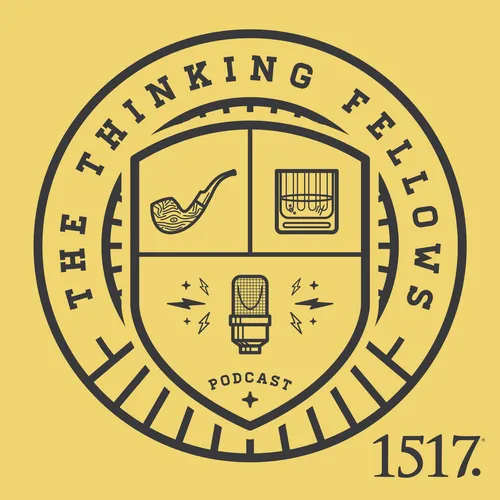
Thinking Fellows
The Thinking Fellows is a 45-minute podcast about theology, philosophy, Christian history, and apologetics. It is hosted by Scott Keith, Caleb Keith, Adam Francisco, and Bruce Hilman. The Thinking Fellows bring high-level subject matters to fun and insightful lay-level conversations each week.
- Update frequency
- every 8 days
- Average duration
- 44 minutes
- Episodes
- 481
- Years Active
- 2016 - 2025

The Magician's Nephew
The Magicians Nephew is the first book chronologically in The Chronicles of Narnia. In this work, Lewis creatively envisions the creation of Narnia and the introduction of evil into the world.
Suppo…

The Horse and His Boy
The Horse and His Boy was the fifth book written in the Chronicles of Narnia. The story takes place in the adjacent lands surrounding Narnia when the Pevensie children and their reign over Narnia. He…

The Silver Chair
The Thinking Fellows comment on the fourth book in the Chronicles of Narnia. When they were first published, this was the first book in the series to not feature the Pevensie children. While some con…

The Voyage of the Dawn Treader
Scott, Adam, and Caleb discuss The Voyage of the Dawn Treader. Originally the third book in The Chronicles of Narnia, this seafaring journey picks up four years after the events of Prince Caspian. Th…

Prince Caspian
Scott and Caleb discuss Prince Caspian, the second book authored by C.S. Lewis in the Chronicles of Narnia. They propose that the predominant Christian theme in the book is the truth of the Gospel an…

The Lion, The Witch, and the Wardrobe
Caleb, Scott, and Adam discuss and comment on the first book in the Chronicles of Narnia. The Fellows outline the basic story of the book while pointing out the Christian themes and literary signific…

The Chronicles of Narnia
Caleb, Scott, and Adam introduce the Chronicles of Narnia. The Chronicles of Narnia is a seven-book series by C.S. Lewis. These books are not only highly influential in the genre of fantasy but are d…

J.R.R. Tolkien
The Thinking Fellows discuss the life and work of J.R.R. Tolkien. Tolkien's fantasy worlds have helped shape and define the entire fantasy genre of literature as it is read today. As a devout Roman C…

The Inklings
Caleb, Scott, and Adam discuss the characters and ideas that made up the Inklings. The Inklings were a group of Christian scholars and writers who gathered in fellowship and furthered their writing. …

Reading C.S. Lewis
Following the introduction to C.S. Lewis and his conversion, the Thinking Fellows speak to the impact and scope of his written works. The charm of Lewis was his ability to communicate both from highl…

C.S. Lewis: The Most Reluctant Convert
Scott and Caleb Keith join Adam Francisco to discuss the life of C.S. Lewis and the docudrama The Most Reluctant Convert, which revolves around Lewis's life and conversion to Christianity. Lewis's co…

Last Theological Will and Testament
Scott and Caleb get to the end of the Smalcald Articles. Here, Luther takes a stand for the proclamation of the Gospel and the necessity of the Reformation. As Luther faces the possibility of his dea…

Baptize Babies
The following several articles of Smalcald are concerned with the application of the Gospel. Luther emphasizes that the power of the Word is given to the church for proclamation and administration in…

Comfort and Assurance
The Thinking Fellows are live from Here We Still Stand Las Vegas with the original cast and special guest Chris Rosebrough. As a pairing with the conference topic the Fellows talk about the role and …

Repentance and the Gospel
Jim Nestingen and Steve Paulson join Caleb and Scott to discuss the Smalcald Articles. Jim and steve used to lecture on the Confessions together, and Luther Seminary and are together again to comment…

The Pope and the Law
Caleb and Scott continue to read the Smalcald Articles. This time the articles focus on the abuses of the papacy. Luther then moves into an outline of doctrine, starting with sin and the law.

The Chief Article of the Christian Faith
Caleb and Scott read through the first several articles of the Smalcald Articles. Here we find an affirmation of orthodox trinitarian theology and a biblically backed presentation of justification on…

Introducing The Smalcald Articles
Caleb and Scott give a historical overview of the Smalcald articles. Many factors were at play; from Luther's personal health issues to looming political threats.

What is the Canon?
John Hoyum joins Caleb Keith to answer some listener questions. The first question is about using quotes attributed to Luther that are apocryphal. The final question revolves around how the Biblical …

Nobody Talks About Melanchthon
Caleb and Scott answer two listener questions. The first question is about addressing or using worldviews as a methodology for engaging culture as a Christian. The second question is about the lack o…